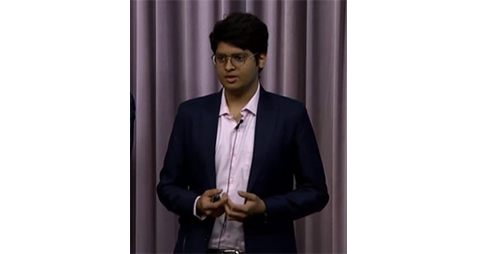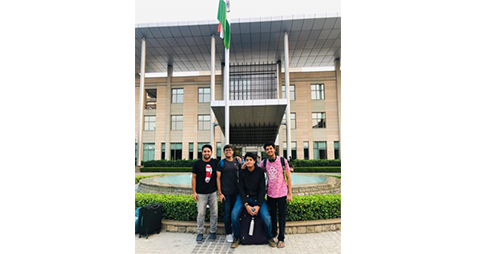Design, Sustainability and Entrepreneurship
Kanishk Chaudhary is a 2022 graduate in Mechanical Engineering from Pilani Campus. He is currently pursuing M.S. in Mechanical Engineering from Stanford University. He possesses vast knowledge on Design Thinking and sustainability and is interested in entrepreneurship as well.

What was your prime motivation to pursue a master's in Mechanical Engineering instead of venturing more into the startup and business ecosystem? How did you manage both of your pursuits?
Pursuing an MS has always been my dream ever since I joined BITS in 2018. Most of my efforts in Pilani were geared towards building a good profile fit for that goal. I think this motivation stemmed from the fact that I always wanted to have at least 2 degrees under my belt and that the experience of studying abroad would always be invaluable.
In my second year, I thought about exploring entrepreneurship. BITS has always been known for churning out great entrepreneurs, so to experience that culture, I took the infamous NVC course with a team of equally motivated folks and continued to build our startup in the early stage for a year and a half. Although I didn’t end up pursuing it full-time, the experience in itself got me excited about understanding and solving real problems and building products that could potentially create a positive impact.
The academic flexibility and culture at BITS pushes all of us to do something productive outside class. I think pursuing a startup as early as possible is a good way to balance both pursuits because the 3rd and 4th years can get more serious. I ultimately had to back out in my 3rd year because I wanted to shift my focus back to MS, but I realized that post-MS, entrepreneurship or intrapreneurship are where I’d like to see myself in.
You were involved in multiple diverse projects during your undergraduate. What are the key differences between the way things worked in these organizations? Is there a difference in the general approach of these technical pursuits in US Tech schools as opposed to the other organizations you worked in?
Technical projects in US schools (or maybe Stanford in particular) heavily focus on teamwork and team building, while those in Indian schools can get a bit more independent and technical. They also equally focus on individual mentorship and ensuring that you gain more soft skills rather than hard ones. Courses are more project-focused and hands-on rather than exam-focused. There is an additional workload in project-heavy courses, but grading is more effort-oriented rather than outcome-oriented, so there’s no pressure to get good grades. When it comes to skill development, surprisingly, both BITS and Stanford have equally forced me to gain technical expertise via self-study.
I don’t have a lot of corporate experience to compare, but I’ve been fortunate enough to intern or work at organizations that really value individual growth and contributions, and this has remained similar across geographic boundaries.

Your interest in design, something very inherent to the idea of engineering, is very axial in all your projects. How did you discover your love for building and designing things during your undergraduate?
I can credit my interest in design to my startup experience in my 2nd year in terms of the ideation-build-execute cycle. The NVC course introduced me to a very generic design thinking process applicable to all kinds of startups.
My first exposure to design within engineering was in my PS-1 at ISRO. Unlike the common notion PS-1 has among students, I feel it really helped in terms of exploring a new domain within Mechnical, something that I never knew existed previously. My project in ISRO was mostly design exploration and simulating a very early proof-of-concept (PoC). It gave me an overview of innovation and design thinking in engineering - how needs are identified, how new innovative products are explored (from ideation to PoC), how benchmarking is done, etc. If you notice, such a process is present in both research and start-ups, no matter if it’s software or hardware.
I was fortunate enough to get a summer internship project (end of my 3rd year) in the medical device industry, involving the same design thinking methodology. This, in turn, motivated my last semester’s study project. During my time at BITS, I was never able to pinpoint an exact technical area that I’d like to specialize in. While exploring different depths during my MS applications, I realized that I could specialize in the only common thread tying most of my work - engineering design. In this way, I could remain a generalist rather than commit to something specific.
You Might Also Like
- From Student to Tech Educator: An Interview with Mehul Mohan on Building Codedamn and Navigating the Tech Landscape
- Navigating the Corporate World: Shashank Agarwal’s Journey from BITS Pilani to Sprinklr
- From BITS Pilani to the IAS: Divyanshu Chaudhary’s Journey of Purpose and Leadership
- A Conversation with Ketan Chandak: From BITS Pilani to Entrepreneurial Success
- From BITS Pilani to Mercedes-Benz: A Journey of Passion, Design, and Innovation


 An Institute of Eminence
An Institute of Eminence






